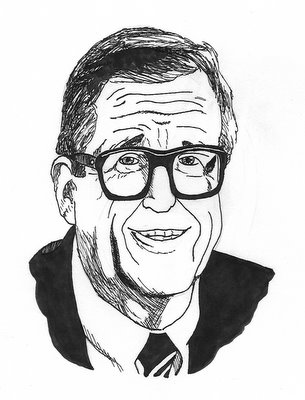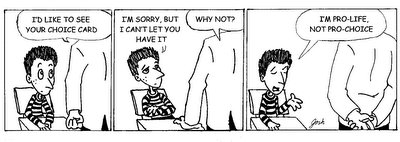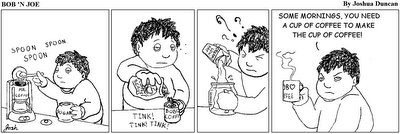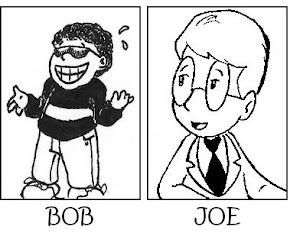
Sunday, November 25, 2007
Monday, October 29, 2007
Anton Chekhov
 Anton Chekhov was a Russian writer in the late nineteenth century. He is most famous for his plays and numerous short stories. Popular playwrite Niel Simon based his hilarious play, The Good Doctor, on these short stories.
Anton Chekhov was a Russian writer in the late nineteenth century. He is most famous for his plays and numerous short stories. Popular playwrite Niel Simon based his hilarious play, The Good Doctor, on these short stories.When my high school chose The Good Doctor for our one-act play, I was asked to draw an ink portrait of Chekhov for posters, programs, and other publicity. Notice the intensity in Chekhov's face.
(p.s. I actually got to play Chekhov in that play!)
Sunday, October 07, 2007
Friday, October 05, 2007
The Scarlet Pimpernel
Sunday, September 30, 2007
Two New Characters!
Sunday, September 23, 2007
Wednesday, September 19, 2007
The Bard
Sunday, September 16, 2007
LCS - Mandatory Volunteerism
Answer Came There None
 I doubt there is any character in literature more fun to caricature than Horace Rumpole. Rumpole is a frumpy British barrister, and the central figure of John Mortimer's Rumpole short stories. Rumpole is old, weathered, skilled at cross-examination, enjoys the occasional cheroot and bottle of Pommeroy's plonk, and is fond of reminicing about his greatest success: the Penge Bulgalow Murders, which he won "alone and without a leader!" The Rumpole stories are a must-read for those interested in the legal profession, or for anyone who loves a good mystery, especially Sherlock Holmes. Or you might check out the television series, with the great Leo McKern as Rumpole.
I doubt there is any character in literature more fun to caricature than Horace Rumpole. Rumpole is a frumpy British barrister, and the central figure of John Mortimer's Rumpole short stories. Rumpole is old, weathered, skilled at cross-examination, enjoys the occasional cheroot and bottle of Pommeroy's plonk, and is fond of reminicing about his greatest success: the Penge Bulgalow Murders, which he won "alone and without a leader!" The Rumpole stories are a must-read for those interested in the legal profession, or for anyone who loves a good mystery, especially Sherlock Holmes. Or you might check out the television series, with the great Leo McKern as Rumpole.
Sunday, September 09, 2007
Wednesday, August 01, 2007
Are You Looking at my Nose?

One of those wild swashbucklers in a masque -
Hat with three plumes, and doublet with six points -
His cloak behind him over his long sword
Cocked, like the tail of a strutting Chanticleer -
Prouder than all the swaggering Tamburlaines
Hatched out of Gascony. And to complete
This Punchinello figure - such a nose! -
My lords, there is no such nose as that nose -
(Edmond Rostand, Cyrano de Bergerac, Brian Hooker
Translation, Act I)
This is the second installment in my new series of portraits of memorable literary characters. And who is more memorable or more of a character than Cyrano?
Wednesday, July 25, 2007
Good and Faithful Servant: Peter Kreeft

Those who have been inspired by C.S.Lewis will relish the writings of Peter Kreeft. Lewis is actually a main character in Kreeft's fictional dialogue Between Heaven and Hell, and Kreeft pays homage to Lewis' famous work, The Screwtape Letters, with his hilarious piece, The Snakebite Letters. However, what sets apart Peter Kreeft from any other author is how he uses Socrates to defend Christian beliefs. That’s right, Socrates! What would happen if the greatest philosopher returned to life in modern times? What would Socrates think of the teachings of Jesus or issues like abortion? Kreeft explores these questions in his series of books starring Socrates. The most dynamic of these is The Unaborted Socrates, in which Socrates defends the rights of the unborn child, and his pro-abortion opponents find his logic unanswerable.
This book should be required reading for anyone struggling with this issue or for those who want to defend their pro-life views. From Socrates, we can learn to spot the flawed logic used to justify abortion and how to convince people that an unborn child deserves life. Once you have a taste of Peter Kreeft’s powerful writing, you will definitely be hungry for more. In addition to The Unaborted Socrates, there are several other Socratic dialogues by Kreeft which can be read in any order. However, if you only read one book about abortion in your whole life, make it The Unaborted Socrates. It will make you think!
Saturday, July 21, 2007
Constant Vigilance!

. . .it was a face unlike any Harry had ever seen. It looked as though it had been carved out of weathered wood by someone who had only the vaguest idea of what human faces are supposed to look like, and was none to skilled with a chisel. Every inch of skin seemed to be scarred. The mouth looked like a diagonal gash, and a large chunk of the nose was missing. But it was the man's eyes that made him frightening.
One of them was small, dark, and beady. The other was large, round as a coin, and a vivid, electric blue. (J.K. Rowling, Harry Potter and the Goblet of Fire, 184-185)
Friday, July 13, 2007
Sunday, June 17, 2007
Still-life in Yellow and Purple
Friday, June 01, 2007
Sunday, May 27, 2007
Tuesday, May 22, 2007
Sunday, May 20, 2007
Friday, April 20, 2007
Sunday, February 11, 2007
Good and Faithful Servant: Chuck Colson

If Richard Nixon wanted something done right and done quickly, he went to Chuck Colson. Colson was not only a vital member of Nixon’s election and reelection team, he was a close friend and advisor of Nixon. “Tricky Dick” applauded Chuck for his strategy and determination, and he gave Chuck the credit for the record-breaking Presidential victory. However, Colson felt worn out after the arduous reelection battle where he had earned the title of Nixon’s “Hatchet Man.” Reluctantly, Nixon accepted Colson’s resignation, but they stayed close. The following years were trying for Colson. When the newspapers had reported a break-in at Watergate months earlier, Colson barely gave it a second thought. As the White House’s ties to Watergate were revealed, many biased reporters accused Colson of ordering the break in. Of course, Colson neither knew beforehand nor did he participate in the cover-up, as Nixon’s security tapes eventually showed, so Colson thought he wouldn’t even be indicted. However, biased newspapers and TV networks asserted that Colson was responsible for the whole affair. It was likely that Colson would be made the scapegoat despite the lack of evidence against him.
During this stressful time, Colson did a lot of soul searching. His life felt so empty after leaving the president’s service. What was there left for him in life? His friend Tom Phillips helped Colson through those troubled times. Tom had once been an ambitious man, climbing the corporate ladder rung by rung until he reached the top. A change seemed to have come over Tom Phillips in recent years: he seemed more genuine, pleasant, and joyful. Colson was surprised to discover that Tom Phillips had “gotten very religious,” talking about how “having a relationship with Jesus Christ” had changed his whole outlook. Colson found this odd. How could Tom talk about having a relationship with a man who lived 2000 years ago? Colson found the answers in Tom’s copy of Mere Christianity. Colson wanted to examine all his religious beliefs and started filling a notebook with his questions, starting with “Is there a God?” Under this heading, he wrote “pros” and “cons.” After reading C.S. Lewis’ first chapter, Colson had filled three pages with “pros” for God’s existence. Convicted by C.S. Lewis’ irrefutable logic, Colson accepted Christ.
Because of liberal bias in the news, Colson was eventually indicted along with three of Nixon’s top aides. One of the men involved with Watergate had plea bargained with the prosecution and only received a sentece of six months. The prosecution made Colson an offer as well: if Colson testified for the prosecution and pleaded guilty to a misdemeanor, he could get out of prison in a few short months, or maybe even avoid prison altogether. However, Colson was innocent and it would be dishonest to admit to something he hadn’t done. He did, however, plead guilty to obstruction of justice, a felony. Because of his honesty, Colson received one to three years of imprisonment.
During his time in prison, Colson started a prayer group with the other Christian inmates. This experience inspired Colson to found Prison Fellowship after his release. Through Prison Fellowship, Colson has witnessed to countless prisoners, showing them how much they need Christ. Colson is also the author of several books, including the story of his salvation, Born Again.
Saturday, February 10, 2007
LCS - I'm Pro-life
 Choice cards are small blue or white cards LCS students recieve at the start of every school year. If your card is signed five times, you reciece a detention. Zach, the spikey-haired boy in stripes, is another of my favorite characters. He plays a lot of video games, loves Star Wars and Lord of the Rings, and. . .well, is pretty zany.
Choice cards are small blue or white cards LCS students recieve at the start of every school year. If your card is signed five times, you reciece a detention. Zach, the spikey-haired boy in stripes, is another of my favorite characters. He plays a lot of video games, loves Star Wars and Lord of the Rings, and. . .well, is pretty zany. LCS - Helicoptors
 Some of the comics I've done have only been published in my school newspaper, The Light. Usually this is because I wrote about some topical issue or about something unique to LCS ("choice cards" were a regular topic). When I wrote this, road closings made it very tricky to get into school. To me, this comic is very symbolic. Bob and Joe coming to LCS. I had been homeschooled from kindergarten and I had never even set foot in a "real school." Also, you'll notice the helicoptor is owned by Duncan Aviation. I was asked more than a few times if my family owned the company!
Some of the comics I've done have only been published in my school newspaper, The Light. Usually this is because I wrote about some topical issue or about something unique to LCS ("choice cards" were a regular topic). When I wrote this, road closings made it very tricky to get into school. To me, this comic is very symbolic. Bob and Joe coming to LCS. I had been homeschooled from kindergarten and I had never even set foot in a "real school." Also, you'll notice the helicoptor is owned by Duncan Aviation. I was asked more than a few times if my family owned the company!
Coach Rockjaw
Good and Faithful Servant: Cal Thomas
 Cal Thomas once received a letter calling him a moron. He was amused by the fact that the word “moron” was misspelled.
Cal Thomas once received a letter calling him a moron. He was amused by the fact that the word “moron” was misspelled. Since 1984, Cal Thomas has published a bi-weekly conservative column which is now published in over 550 newspapers, and he is the author of over several books including The Things that Matter Most, The Death of Ethics in America, and Blinded by Might (with Dr. Edward Dobson). Also, he has traveled across the country speaking at schools and churches, defending his beliefs and offering advice. “I read the New York Times and my Bible every day so that I know what each side is doing,” Cal is fond of telling his audiences.
Cal Thomas first worked with NBC News as a copy boy. Then one Friday, his boss asked him if he had a minute and told Cal he was being laid off. Before that, Cal used to have a low opinion of people who lived on Welfare. “They’re lazy. They live off my tax money.” Then he found himself visiting the unemployment office and accepting Welfare checks. He called everyone he knew, looking for a job, but people who he thought were his friends didn’t return his calls. One day, sitting in the unemployment office he was struck by his situation. A few days earlier, he owned a press pass that allowed him to enter the White House and stand next to the President. That day he was sitting next to a truck driver with mud on his shoes. During this time, a friend told Cal and his wife about a prayer breakfast movement. At the prayer breakfast, Cal heard about having a relation with Jesus Christ. “Excuse me?” he thought. He had gone to church and all that, but he had only thought of Christianity as a religion. A speaker read a Living Bible at the breakfast. Cal realized that he had never read the Bible and quickly purchased a copy. He found out that God exists objectively, regardless of what people think, and that people are not basically good. In fact, people are basically bad! Fortunately, he also read about God’s forgiveness. Nobody told him all this; he learned it from reading the Bible.
What sets Cal apart from some other conservatives is that he doesn’t just poke fun at liberals, but he gives good advice to his religious audience. Christians would do well to remember his insights.
“Abortion is not the cause of America’s depravity, it is a reflection of it,” he has stated repeatedly. A common anti-life argument is that even if we illegalize abortion, abortions will still take place by the thousands. Of course, this “argument” isn’t an argument at all; it’s an assertion. We have laws against murder and drugs and child abuse, but all those things take place everyday! However, the assertion is true. Laws against abortion will not save many unborn lives. In order to do that, we have to change hearts. The same is true with many other issues Christians are passionate about: gay marriage, euthanasia, embryonic stem cell research, violence and depravity.
“Some people look upon elections as a salvation experience. That if we can just get the right people into office, then we can have what I call ‘trickle-down morality.’ How can government do that? The number-one problems in America are not economic and political! They are moral and spiritual! They are beyond the reach of political leadership,” Cal Thomas explains. Of course, this doesn’t mean that Christians should withdraw themselves from politics. “Elections are important, but they’re not decisive,” he continues. We can do all we can, but if America is going to change it must be God’s will. “God, make America worthy of your blessing again,” he concludes.

























